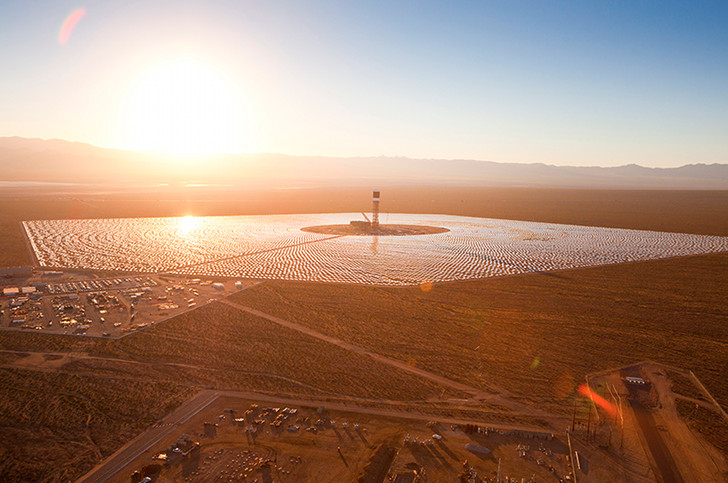
The much-anticipated Ivanpah Solar Electric Generating System just kicked into action in California’s Mojave Desert. The 3,500 acre facility is the world’s largest solar thermal energy plant, and it has the backing of some major players; Google, NRG Energy, BrightSource Energy and Bechtel have all invested in the project, which is constructed on federally-leased public land. The first of Ivanpah’s three towers is now feeding energy into the grid, and once the site is fully operational it will produce 392 megawatts — enough to power 140,000 homes while reducing carbon emissions by 400,000 tons per year.
Ivanpah is comprised of 300,000 sun-tracking mirrors (heliostats), which surround three, 459-foot towers. The sunlight concentrated from these mirrors heats up water contained within the towers to create super-heated steam which then drives turbines on the site to produce power.
The first successfully operating unit will sell power to California’s Pacific Gas and Electric, as will Unit 3 when it comes online in the coming months. Unit 2 is also set to come online shortly, and will provide power to Southern California Edison.
Construction began on the facility in 2010, and achieved it’s first “flux” in March, a crucial test which proved its readiness to begin commercial operation. Tests this past Tuesday formed Ivanpah’s “first sync” which began feeding power into the grid.
As John Upton at Grist points out, the project is not without its critics, noting that some “have questioned why a solar plant that uses water would be built in the desert — instead of one that uses photovoltaic panels,” while others have been upset by displacement of local wildlife—notably 100 endangered desert tortoises.
But the Ivanpah plant still constitutes a major milestone, both globally as the world’s largest solar thermal energy plant, and locally for the significant contribution it will make towards California’s renewable energy goal of achieving 3,000 MW of solar generating capacity through public utilities and private ownership.


